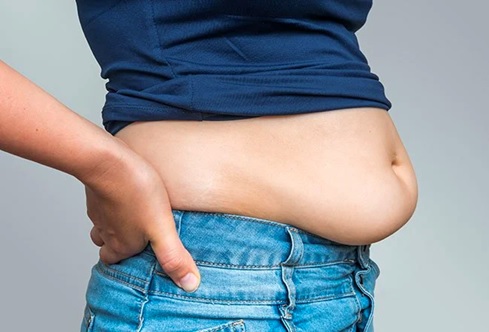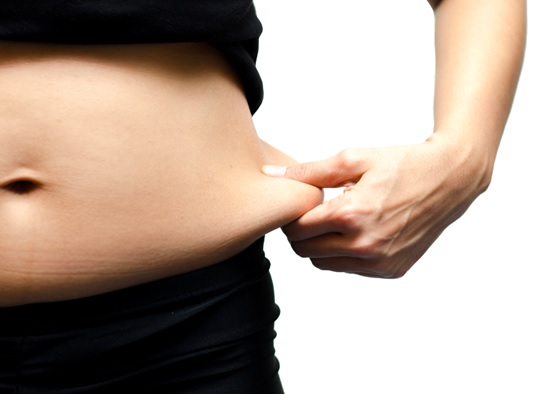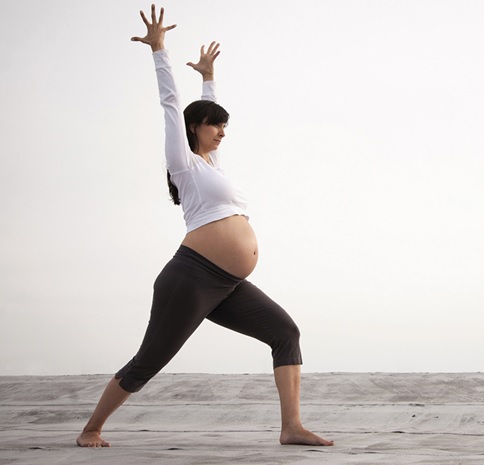
Do you have pudgy parts on your body that you want to work off? Many of us want to reduce fat in certain areas but unfortunately this isn't always possible. Although all humans are susceptible to gaining weight, we don’t all store it in the same places. Where our fat tends to sit is dependent on factors like hormones, sex and genetics.
A little extra cushioning (also known as subcutaneous fat) in some places isn’t necessarily a bad thing. In fact, it is very healthy to have some extra padding. Not only does it protect your bones but it is also stored energy that your body can use as fuel. If you’re keen to know more about why your thighs might be a bit wobblier compared to other areas on your body then read below.

Sex Differences
One primary influencer of where you store fat (adipose) is your sex. On average, women have higher body fat than men. A healthy body fat for a female is between 14-31%, whereas for a male it ranges from 6-24%. This is because women bear children and need sufficient body fat to maintain healthy menstruation cycles.

You might have noticed this first hand but men and women store their fat in different areas. Females tend to store their fat around their hips because it is physiologically advantageous during pregnancy to have a bit more fat around the butt and thighs. Males on the other hand tend to hold fat around their stomachs. This is why you often hear women complaining about thunder thighs whereas men are known for their beer bellies. Although both sexes are equally able to put on body fat, the distribution of the adipose varies. It is possible for an obese man to have less leg fat than a woman in a healthy weight range.
Hormones
Our bodies are full of different hormones and some of them impact where we store fat. Oestrogen and testosterone obviously play a significant role because there are such differences in body compositions between sexes. However other hormones like cortisol also make a difference.
Oestrogen encourages the storage of fat around your breasts, butt and thighs. Testosterone on the other hand causes you to have a higher muscle to fat ratio. Bodies with higher oestrogen levels are more likely to have Kardashian sized butts, whereas those lower in oestrogen may be leaner with more abdominal fat. Women who have been through menopause might already know this from experience. During menopause, oestrogen levels drop which can lead to fat shifting from the butt to the tummy region. As women age, they might morph from a pear shape into an apple.
Cortisol is known as the stress hormone, however it has a range of functions. Just like our sex hormones, cortisol can affect fat distribution. Those with chronically high cortisol may have more visceral fat (around the organs). This is exactly where we don’t want it. More fat around the organs increases your risk of health issues like insulin resistance and cancer. Basically, if you have high levels of cortisol you may also have increased central fat storage. If less belly fat is one of your goals then addressing your stress levels might be a great place to start.
Genetics
We know that genetics play a big role in body fat storage however the details remain poorly understood. If you tend to store a lot of fat in your thighs, then it is likely your parents and children will too. In saying this, genetics are not wholly determinative. Your environment can alter the expression of genes. This means that even if you are genetically predisposed to carry a lot of fat, you could prevent the expression of those genes by regularly exercising. For example those who store a lot of body fat in their lower body could still alter the appearance of their legs through resistance training.

Diet
The type of foods you consume may also affect where your body fat goes. As mentioned above, visceral fat is the kind stored around your organs. As opposed to subcutaneous, visceral fat isn't very healthy for us. If you have a disproportionately large midsection, you might be carrying too much fat around your organs. The good news is that you can mitigate this through diet.
Certain foods like alcohol, refined carbohydrates, trans-fats and processed junk can lead to visceral obesity. Studies show that you can lose visceral fat by removing unnecessary carbohydrates from your diet If you regularly consume these kinds of foods, try to swap them out for more vegetables, meats, eggs and fruits. Laying off the booze can also make a big difference. It is called a ‘beer belly’ for a reason. If you want a leaner midsection or visible abs, then take a look at your food intake. Simple swaps here and there can help you go from a Homer Simpson stomach to Channing Tatum abs.
Can I Get Rid Of It?
It is well established that in order to lose fat, you must consume less calories than you burn. Without a calorie deficit, your body will keep holding onto the fat it already has. Trying to lose weight without changing your nutrition or activity levels is a Sisyphean task. If you want to decrease your body fat, start by tracking your food intake and getting help from someone with nutrition expertise.
If you’re at a healthy body fat and are trying to spot reduce, your goals might be slightly harder to achieve. The leaner you get, the harder it will be to lose extra body fat. However some research suggests that reducing fat in a certain area could be possible. A recent study found that groups who focussed on lower body strength training lost more fat from their legs compared to their upper body. The same occurred for the group who focussed on upper body resistance training. Although more research is needed, it is true that you burn more fat in regions near active muscles. Potentially, you could reduce fat from your legs by increasing the volume of your lower body exercises. However you would still need to be in a caloric deficit to achieve a reduction in body fat.
Conclusion
Unfortunately we can’t pick and choose where we store body fat. Having a little extra cushion in some areas is not unhealthy. Ladies with thicker thighs compared to their upper bodies have nothing to worry about. This is completely normal. Your genetics will largely determine where the extra energy gets stored. If you are serious about reducing fat in certain areas, you may be able to do so by increasing your weight training frequency and implementing a calorie deficit. The most important thing is that you’re at a healthy weight that feels good for you.
